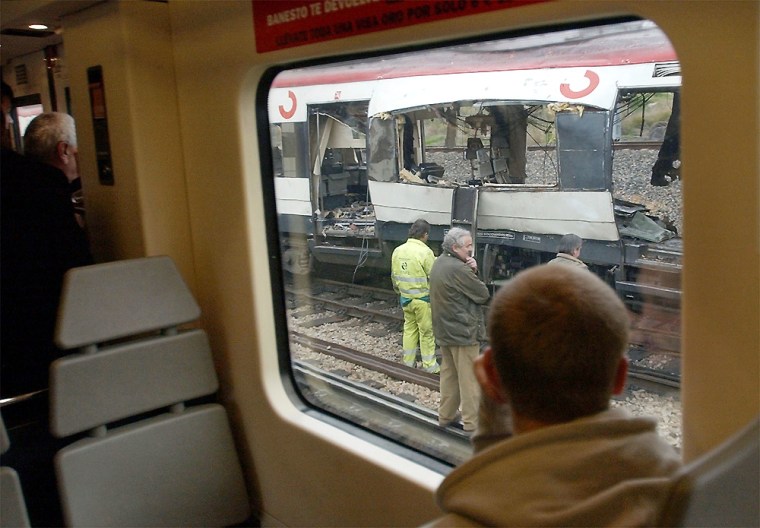Commuters fell silent as their train rolled past the bombed-out hulks of twisted metal on an adjacent track. Some looked away or shook their heads. Others wept.
The wreckage of two of four trains remained on the tracks Friday near Madrid’s Atocha station, a day after they were torn apart by terrorist blasts that killed nearly 200 people and wounded 1,400 others. Blood stained the tracks and torn clothing still lay scattered on the ground.
The view was just too painful for some.
“I came with a lot of fear,” said Isabel Galan, 32, her makeup streaked from crying.
“I saw the trains and I burst into tears. I felt so helpless, felt such anger,” said Galan, of Fuenlabrada on Madrid’s outskirts.
Usually boisterous, Madrid was submerged in grief Friday.
Black bows of mourning were everywhere—on Spanish flags that hung from balconies, on shop windows and the lapels of coats, even on the fronts of the commuter trains.
At Atocha station, a normally bustling transport hub just south of the Prado Museum, the quiet was broken by the sobs of mourners who lit candles and left flowers.
Like the rest of Spain, Madrid’s streets filled at noon Friday for a silent tribute to the dead on the first of three days of mourning. Traffic stopped and people stood in the rainy, cold weather for about 10 minutes, then broke into spontaneous applause in a traditional sign of respect and farewell.
As night fell, the capital’s streets filled again with more than a million people huddling under umbrellas against a steady rain and splashing through puddles toward the Plaza de Colon in a dramatic display of solidarity against terrorism.
'Spain's Sept. 11'
Newspapers called Thursday’s rush-hour attacks Spain’s Sept. 11, and just as in New York 2 years ago, relatives of the missing went from hospital to hospital to search for loved ones.
A sprawling trade center on the capital’s outskirts was turned into a makeshift morgue, and for many searchers, it was the last stop. Hundreds of counselors and volunteers handed out blankets and hot drinks to grieving family members gathered at the sprawling trade fair center.
Jeanette and Gisela Llanga, two sisters who emigrated from Ecuador, were looking for a brother, Luis Gustavo, and a cousin, Angel. They had already called hospitals in their 24-hour search before joining hundreds of others at the morgue.
“There are bodies that haven’t been identified yet. I need to find out. I’m so worried because I don’t know anything,” said Gisela, 26.
Steeling themselves for the worst, they waited on the second floor of the center while officials brought up a list of dead from downstairs.
Mercedes Lopezosa’s search for her 31-year-old cousin and his 28-year-old wife, married 10 months ago, had already ended. Police had told her they were dead, and she was waiting to confirm the bodies were at the morgue.
“The bodies must be in a terrible state,” she said. “It’s so painful.”
Of the more than 1,400 injured, 367 people remained hospitalized, about 50 in serious condition, authorities said.
Chilling accounts
Gruesome photographs and chilling accounts from survivors and eyewitnesses filled newspapers.
Isabel Pinto at El Pozo station told El Mundo newspaper she “saw people escaping from the train asking, ‘Have I got eyes?’ ‘Have I got a face?’ ‘How am I?’ ‘Is any of me missing?’ They were like zombies.”
The newspaper also likened the bombings to the Sept. 11 attacks by running a cartoon that noted Spain’s scheduled election Sunday and showing a jetliner into a skyscraper-like ballot box.
Friday’s commuters were filled with fear. Four of Atocha’s six regional and commuter rail lines were open to traffic, and most trains were running as normal—but they were half empty.
“There are fewer passengers. We can see people are affected,” said Jose Martinez, an official with the RENFE state railway company. “I don’t normally look at the passengers, but today I did.”
At Atocha station, candles, flowers and handwritten messages were placed lovingly on the ground. Others left small postcards of Jesus Christ and the Virgin Mary.
“We’re with you,” said one message. “Today, they killed me and every Spaniard.”
